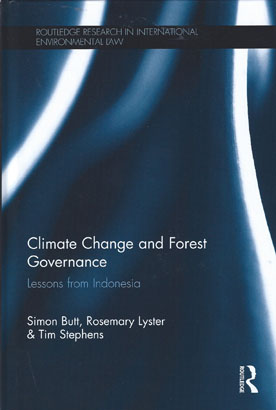
This book provides a comprehensive assessment of the emerging legal and policy framework for managing Indonesia’s forests as a key global policy to address climate change.
Deforestation in tropical rainforest countries is one of the largest contributors to human-induced climate change. Deforestation, especially in the tropics, contributes around 20% of annual global greenhouse gas emissions and, in the case of Indonesia, amounts to 85% of its annual emissions from human activities.
This makes Indonesia the world’s third highest emitter of greenhouse gases. ‘Reduced Emissions from Deforestation and Degradation’ (REDD) is the central international policy being adopted to reduce emissions from deforestation, and was adopted under the United Nations Framework Convention on Climate Change (UNFCCC) at the Bali Conference in 2007.
This book is the product of a three-year program of research funded by the Australian Research Council, and provides the first extended analysis of the on-the-ground implementation of avoided deforestation policies in Indonesia. The book is unique in combining both an assessment of the international rules for forestry governance, with a detailed assessment of the legal and institutional context in the globally most important test case jurisdiction for the effective roll-out of REDD.
Although focused on one jurisdiction, Indonesia, the book has significant implications for forest governance globally. The majority of the world’s tropical forests are located in the Global South, and while there is diversity in the economic, political and legal systems of the most heavily forested countries in the tropics (Brazil, the Democratic Republic of the Congo, Indonesia, Peru and Colombia) all face many similar challenges in forest resource management to address climate mitigation imperatives, in particular in providing safeguards for local communities and indigenous peoples.
This book will be of great relevance to students, scholars and policy-makers with an interest in international environmental law, climate change and environment and sustainability studies in general.